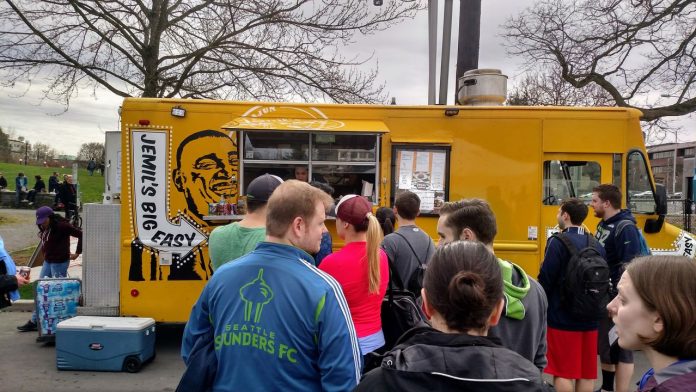While the vast majority of Seattleites identify as progressive when polled, the City of Seattle’s approach to many of its biggest problems is fundamentally conservative. The status quo rules the day, barring herculean efforts. Our use of public street space is a prime example.
The amount of planning, outreach, stakeholdering, discourse, and delay required to make the smallest change borders on absurd. Bike lane projects start feeling like a lunar landing mission, and full-bore street pedestrianization like colonizing Mars. Seattle’s recent push to liberalize food truck and food cart regulations and make Seattle’s street café program permanent is another example of a great idea to make streets more pleasant (and tasty) places to be running into an inexplicable opposition.
Food truck liberalization
Who wouldn’t like more food options at reasonable prices in their neighborhood? Why pass on the benefit of enlivening streets and parks while providing more opportunities for entrepreneurs to start a business without a huge capital outlay that brick and mortar storefronts entail? If we agree about nothing else can we at least agree that a truck dispensing tasty goodies like street tacos or dumplings or curried scallops or the miracle that is sushi burritos should be invited as close as possible to our appreciative homes and jobs?
But no. That would be too easy. Seattle is the land of tortured decision-making and a million concerns.
Instead of welcoming a modest food truck expansion and moving on without much drama or debate, Alex Pedersen stepped into the arena — eager to put himself between the public and a good time. Pedersen submitted a series of amendments kneecapping the legislation carefully crafted by Seattle Department of Transportation (SDOT) with the support of Councilmember Dan Strauss. Instead of expanding where food trucks would go, Pedersen mostly wanted to keep the old rules. A simple update and modernization had to be turned into a big debate.
Tellingly, even the Seattle Restaurant Alliance doesn’t support Pedersen’s amendment keeping the existing restriction barring food trucks 50 feet from existing restaurants and coffee shops, The Urbanist’s Ryan Packer reported. Pedersen ultimately withdrew that amendment, citing overwhelming public opposition, but he did succeed in passing a different amendment adding a new hurdle in 2024, a report measuring the “impact” of the rule’s removal on existing businesses.
The existing rules Pedersen wanted extended are ridiculously strict and onerous. A U.S. Chamber of Commerce “Food Truck Nation” study pegged the cost of running a Seattle food truck at $32,000 per year compared to just $5,410 in Portland, a six-fold burden. A big part of that is fees, red tape, and limited siting opportunities. “Food trucks have to be at least 1,000 feet away from a high school, and 50 feet away from a public park,” Packer wrote. “Food trucks are also not permitted adjacent to the vast majority of the parcels in the city that are zoned low-density residential, including single family zones (recently renamed to neighborhood residential), residential small lot, or even low-rise zones.”
Even with Strauss’s reform package intact, it doesn’t go far enough to become a national leader in food truck access like Portland or Denver. But at least it’s a step and acknowledgement that we should be welcoming more such businesses into Seattle rather than throwing up costly speed bumps.
A pattern of blocking street changes for Pedersen
The obstructive move is true to character for Councilmember Pedersen, whose three years chairing the transportation committee has been rife with stunts in a similar vein. He’s killed bike lane projects. He’s made it his mission to swipe transit funding for poorly thought-out and minuscule bridge bonds that even SDOT keeps telling him isn’t a great idea. All the while mostly ignoring or brushing off a pedestrian safety crisis that’s blown up under his tenure.
With colleague Sara Nelson providing the decisive 5th vote, Pedersen finally succeeded in getting his way this budget cycle on the bridge bond thing. Then both proceeded to vote against the entire budget, which earned the ire of Budget Chair Teresa Mosqueda.
The move to swipe transit funding was poorly timed. Transit service and reliability has tanked since 2019 and the City and County have done very little to address that. Instead Pedersen is diverting transit funding and opportunistically claimed he’ll prevent the something like the two-year West Seattle Bridge closure from happening again. This claim is a stretch since SDOT has said the West Seattle Bridge cracked and sagged due to a design defect, not a lack of maintenance. Plus, the bridge maintenance backlog is an order of magnitude larger than the money he’s shaken out of transit programs. He hasn’t solved anything, but at least he scored some political points and postured as very serious about bridges.
This is who runs transportation policy in Seattle. We cannot embrace food trucks because of grouchy neighbors with parking concerns who’ve truly found their voice in Alex Pedersen. We can’t fully fund and prioritize transit because Pedersen and company are too busy finding a fresh coat of paint for a bridge. And we can’t solve the safety crisis because we’re too scared to change anything and too bogged down Seattle Process-ing every little thing to get around to the big stuff.
While gridlock, indecision, and lengthy process may be an ideal state for conservatives cheering on Pedersen, progressivism requires progress. It’s time to take some steps forward. We have to begin welcoming new uses of our street space to promote goals like safety, climate action, environmental justice, and small business opportunity instead of inventing every reason to keep things mostly the same.
Doug Trumm is publisher of The Urbanist. An Urbanist writer since 2015, he dreams of pedestrian streets, bus lanes, and a mass-timber building spree to end our housing crisis. He graduated from the Evans School of Public Policy and Governance at the University of Washington in 2019. He lives in Seattle's Fremont neighborhood and loves to explore the city by foot and by bike.



